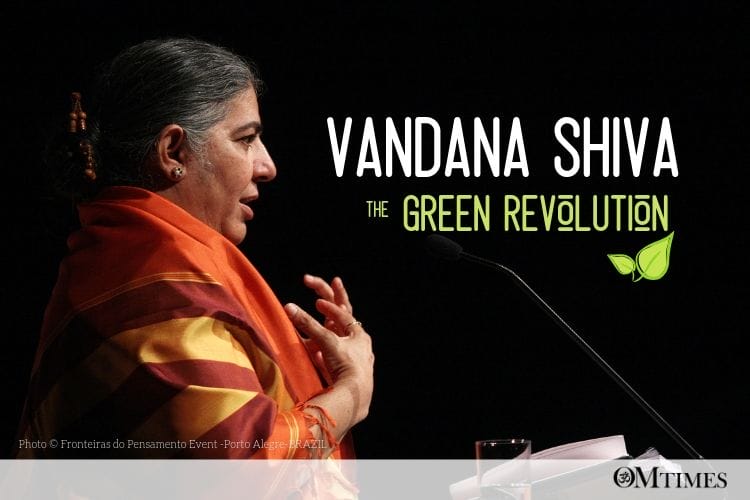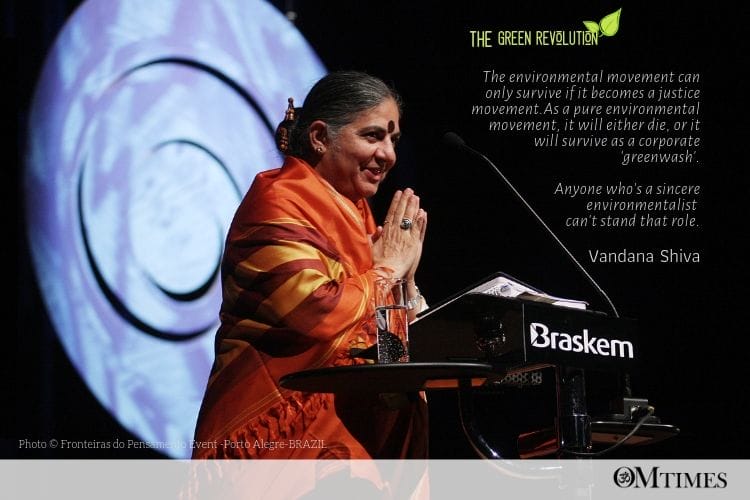Vandana Shiva: The Green Revolution

VANDANA SHIVA: Well, look at the roots. I mean, the word “radical” comes from the roots. So, for me, a radical scientist is one who’s rooted in actual knowledge, truth, and independence. And for that reason, is also rooted in the knowledge that has lasted, and all knowledge that has lasted is the knowledge that makes us recognize interconnections.
Soil, not oil, holds the future for humanity. Vandana Shiva
PATRICK PITTMAN: People started to take notice of your work on a global level with your work on seed politics, and Monsanto, round about the same time as the World Trade Organization was kicking into gear.
VANDANA SHIVA: Yeah, but you know, I got exposed to this in 1987; because of my book on the Green Revolution, I was invited to an early meeting on biotechnology long before there was commercialization. The industry laid out its plan, and the plan was threefold. You’ve got to genetically modify to take patents because we can’t just go and say, ‘The seed is my invention,’ you’ve got to do something to it to make it look different. So genetic engineering was the gateway to what they wanted. Patenting so they could collect royalties. And they wanted this on a global scale. So, they wanted the WTO to impose these rules of patenting worldwide.
1987 is when I started saving seeds and started Navdanya. Of course, there was no law on paper by then, but the agenda of the corporations was there. 1991 was when we got the leaked draft of what became the WTO, the Dunkel Draft Text, it was called. And we called it the DDT. I started traveling the country explaining this to farmers and built up a movement. There has been a redefinition of who is the creator, the owner, of this planet, and its beautiful diversity of life. I don’t think there’s been any tectonic shift as deep as that, and most people didn’t even notice it.
As a human being, you are duty-bound to get engaged. When you find injustice, when you find unfairness when you find untruth, but you have to get engaged knowing that you have no control over the outcome.
PATRICK PITTMAN: A couple of years ago, you were at the UN in New York for a discussion on Bhutan’s Happiness Index. I find that very interesting—let’s look at another way to measure the success of a country that’s not economic growth. They’re doing some interesting stuff there.
VANDANA SHIVA: They are. Very courageous stuff. Years ago, the prime minister invited me to a conference. I delayed my trip to Copenhagen for two days just to do this meeting in Bhutan. I’d done my book, Soil Not Oil; we’d just finished the study on the Himalayas, “Climate Change at the Third Pole.” So, I talked of all this and then the prime minister asked me to come back and help the transition to a 100 percent organic Bhutan. As he wrote in his letter, “The only way we’ll grow happiness in a society which is largely agriculture is by growing organic.” From our experience, he could see what the Green Revolution has brought. A quarter-million farm suicides. Cancer; there’s a cancer train that runs out of Punjab every night. Water is gone, poison everywhere. And he doesn’t want to see Bhutan that way. Bhutan always talks of happiness and well-being. And well-being very clearly is another way of measuring the economy.
PATRICK PITTMAN: You won the Sydney Peace Prize a few years ago. I wonder if you could talk for a moment about the link between your work and what that means for the building of peace in the world.
VANDANA SHIVA: I started working in organics in 1984. As I said, Bhopal had happened, Punjab had happened. These were both huge incidents of violence; in Bhopal, thousands had been killed in one night. And in Punjab, thirty thousand had been killed in extremist violence. That’s when I started to study the Green Revolution.
So, the very roots of my engagement with organic farming begin with a search for a solution that is non-violent. For me, organic has always been about peace-making with the earth — peace-making for people.
Why should people be dying of cancer? Why should farmers be committing suicide? Why should we, if we are angry, take guns and shoot each other? Peace has quite clearly been the motivating factor for me to do all this, both peace with the earth and peace among people.
PATRICK PITTMAN: You’ve come back a few times in what you’ve been talking about to the tragedy of the farmer suicides in India over the last fifteen years. When did this phenomenon become noticeable to you?
VANDANA SHIVA: It started in 1997. I rushed down to study the first one in Andhra Pradesh, a young man who grew food crops. He was told he’d be rich with this hybrid cotton. He borrowed heavily to get the seeds. Borrowed heavily to drill a tube well. Borrowed heavily for the chemicals. He couldn’t payback. He committed suicide. He used to grow food, and he was never in debt before that. That was the first study we did. And we’ve monitored it since then.
Most of the suicides are in the cotton belt. Most of the cotton is now genetically modified cotton, Monsanto’s cotton. Now, while the trend is so very clear—that the suicides are because of debt, the debt is because of the cost of seed and chemicals, and this cost is extremely high in the cotton areas—every year there’s a fake study that is floated by Monsanto. I’ve done this work long enough to know who speaks for them, which scientist does their studies, which so-called “farmers’ union” puts out a study. There’s one new one saying, ‘Oh, the indicator that this has done well is the higher levels of consumer expenditure.’
My God, you take the food away from people, you stop them from growing everything and take away their serenity. They’ll have higher expenditure! That’s an indicator of poverty, not of prosperity!
Two years ago, they brought out a study on how women are doing better. What was the indicator? “more women are working in other people’s cotton fields.” Their study said they’ve been going to the homes to see what is happening, and they say, “Therefore we can assume the men are looking after the children and taking charge, and this is the liberation of women.” And I had to write a response and say, “No, the men have committed suicide. That is why women who work in their fields to grow food for their children are now working in other people’s cotton fields, as slave labor, to be able to get something back for the children.”
It’s all so manipulated. And those who don’t know get impressed and say, ‘Oh, there’s a debate.’ There’s no debate. There are lies versus truth. There’s never a debate between lies versus truth!
PATRICK PITTMAN: So, to your mind, with those things in mind, there are no issues with small scale diverse farm production scaling to feed not just India’s population, but also the vast cities and metropolises of the world. Do you believe you can feed a world to that level without industrial agriculture?
VANDANA SHIVA: Well, India’s feeding itself with small farms. Eighty percent of the world’s food is not coming from the monoculture agribusiness farms controlled by the dominant cultures of the world. Eighty percent of the food comes from small farms. So, when we consider scaling up of the small farms, for me, scaling it up is not destroying the small farm to make the large farm — not destroying the biodiversity to make the monoculture. But taking those large farms and turning them into bio-diverse farms. That is the scaling up we need.
PATRICK PITTMAN: You’ve got a lot of work still to do. You’ve been working hard for a lot of years. But what is it that will let you know that this fight is working? Is that worth it?
VANDANA SHIVA: Well, for me, it’s worth it every day just because I’m following my conscience and doing what my conscience says is the thing to do. I go to sleep very peacefully; I get up very peacefully. But I am putting a lot of energy this year in taking the issue of seed, which is what propelled me to do the work of Navdanya from ‘87 onwards, to a very global level of public understanding. You know. Some people are doing seed saving. Some people are fighting patents.
There are individuals and small groups. But the juggernaut of destruction is so huge, and now country after country is passing laws to criminalize farmers’ seeds. To collect royalties from anything a farmer grows, whether it was bought from Monsanto or not. And in effect, it is to strangle every alternative.
So, we’ve started the Seeds of Freedom campaign, a global movement. And what I want to do over the next three years—I don’t know what the outcome will be, but I feel the imperative to do it—is that the issue of patenting gets understood by a lot more people. So that a lot more people start to realize that this is so wrong and start to take actions. Not just the farmer who was saving seeds which is today being criminalized, but every organic grower, every organic eater. The little restaurant that wants to get good delicious vegetables and knows that tomorrow this will be impossible and all you will get is Monsanto seeds. So, to create a very broad wave of both awareness and outrage. And to call for no patents on seed. And to create actions that allow it to happen.
Why do I take even hope in this? Because we’ve done it in India. When I started seed saving, I did it to fight patents. And I took inspiration from Gandhi. Facets of Gandhi. Gandhi didn’t have just one facet. He didn’t just resist. He created and resisted. He said, ‘If you don’t create an alternative, your resistance will never be strong.’ So, I took inspiration from the spinning wheel.
That’s why I started saving seeds, I asked, ‘Gandhi fought the British Empire with a spinning wheel, so what’s the spinning wheel of today?’
And the seed is what came to my mind. And on the other side, I said, they’re not going to stop making laws just because some of us think it’s an outrage that you haven’t invented the seed and you call it your invention. Something’s going wrong very deeply. And then you collect royalties, and we’ve seen this for fifteen years, you collect royalties that kill farmers. It was always an ethical outrage, but now it’s becoming a social human rights abuse.
Gandhi said to the British, when the salt laws were being enforced, that, ‘We have a duty to continue to make our salt, we won’t obey your law.’ So that day onwards, from 1987, we said, ‘We’re going to save seeds, but we’re going to save seeds with the declaration that we do not obey, we do not respect patents on seeds because it’s a brute law. It’s an unjust law. And it’s our duty to not obey.’ All our members, our 650,000 people who are associated with Navdanya—in campaign movements, seed saving, organic farming—all take this simple pledge: we received our seeds from nature and our ancestors, we’ve got to pass them on to future generations. We will not respect any law that makes this illegal.
This Interview was originally posted on dumbofeather.com It has been reprinted by OMTimes with Permission.
About Patrick Pittman
Patrick Pittman is a writer, editor, broadcaster, former editor of Dumbo Feather and one-time nightshift career of a supercomputer. More at https://patrickpittman.com/
Photo © Fronteiras do Pensamento Event -Porto Alegre- Brasil
OMTimes Magazine is one of the leading on-line content providers of positivity, wellness and personal empowerment. OMTimes Magazine - Co-Creating a More Conscious Reality








